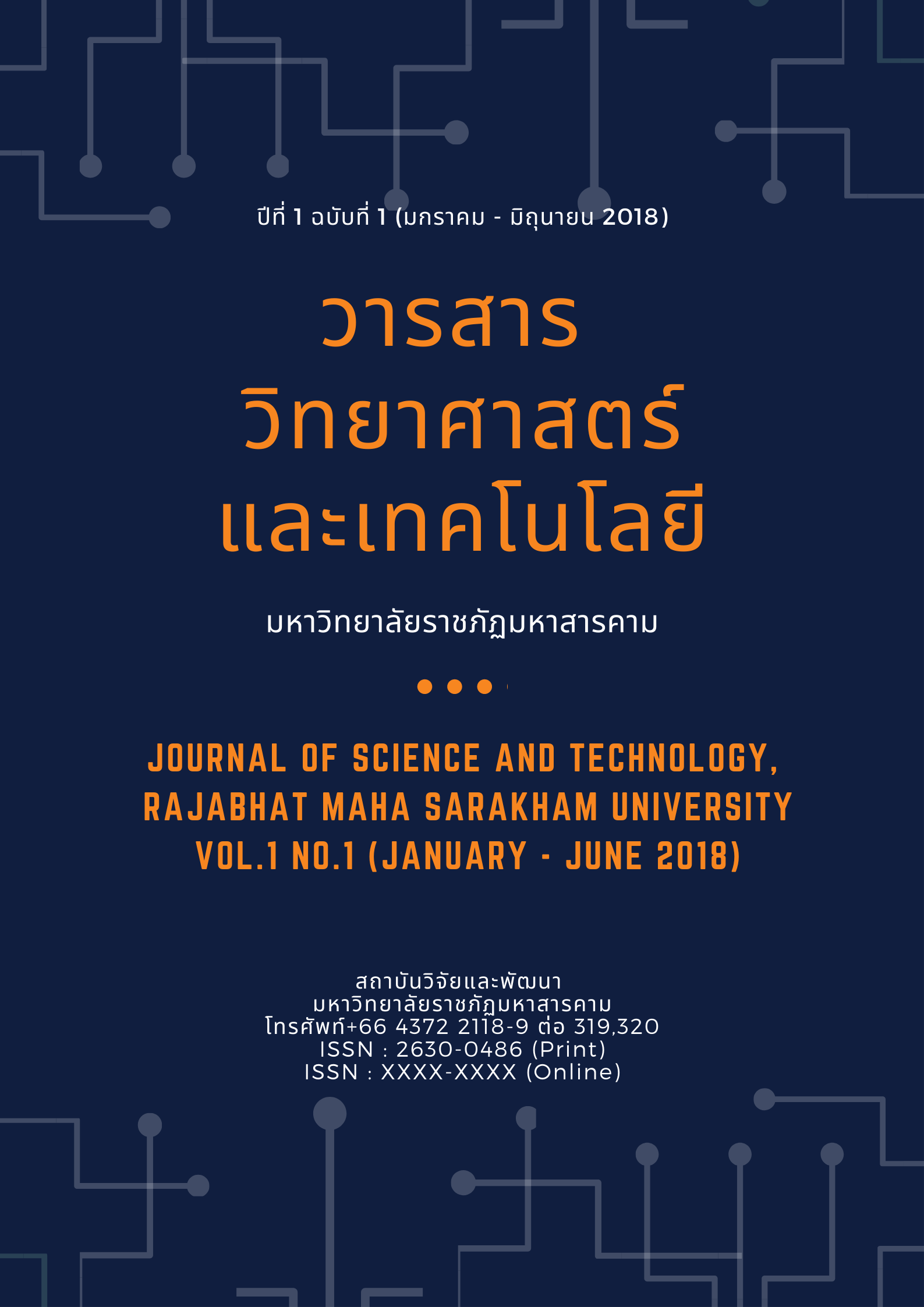A Development Adaptive Content Web – Base Instruction. On : Data Investigation on the Internet for High Vocational Certificate level
Abstract
The purposes of the research were to development adaptive content Web – base Instruction.
on : Data investigation on the internet for high vocational certificate level, to Study the performance of adaptive web – base instruction, and to find the sample’s satisfaction in the lessons. The research methodology system approach of 4 steps : 1) Analysis, 2) Design, 3) Development, and 4) Implement. The samples of the research ware 34 high vocational certificate level at Maha Sarakham technical college. The research instruments were adaptive content web – base instruction, questionnaire for expert of research’s form techniques, and questionnaire for sample’s satisfaction. The statistics used for analysis and evaluation were means, and standard deviation.
The research findings showed that 1) The development of adaptive content web–base instruction lesson consisted management systems that registration system, website management system, teaching management system, learning tracking system, data management system, and lesson presentation.
2) The result of performance evaluation by technical experts revealed that their opinion was at high level (= 4.49, S.D. = 0.52). and 3) Students were satisfactory to the lesson at high level (= 4.40, S.D.=0.53) .
References
กัลยานี จองหวัง. (2552). การพัฒนาบทเรียนคอมพิวเตอร์ช่วยสอนแบบปรับเปลี่ยนเนื้อหาโดยใช้เทคนิค Page Variants ในวิชาเครือข่ายคอมพิวเตอร์เบื้องต้น. สาขาวิชาเทคโนโลยีคอมพิวเตอร์ ภาควิชาคอมพิวเตอร์ศึกษา คณะครุศาสตร์อุตสาหกรรม มหาวิทยาลัยเทคโนโลยีพระจอมเกล้าพระนครเหนือ.
ชัยยุทธ จันทร์แปลง. (2551). การพัฒนารูปแบบกิจกรรมการเรียนรู้บนเครือข่าย วิชาเทคโนโลยีสารสนเทศเพื่อชีวิต หลักสูตรปริญญาตรี มหาวิทยาลัยราชภัฏมหาสารคาม. มหาสารคาม. วิทยานิพนธ์ปริญญาวิทยาศาสตร์มหาบัณฑิต สาขาเทคโนโลยีคอมพิวเตอร์เพื่อการศึกษา บัณฑิตวิทยาลัย มหาวิทยาลัยราชภัฏมหาสารคาม.
ไชยยันต์ สกุลไทย. (2552). การพัฒนาบทเรียนคอมพิวเตอร์ช่วยสอนแบบปรับเปลี่ยนเนื้อหาผ่านเครือข่ายคอมพิวเตอร์ วิชาดิจิตอลเบื้องต้น สำหรับนักศึกษาระดับปริญญาตรี โปรแกรมวิชาวิทยาการคอมพิวเตอร์ มหาวิทยาลัยราชภัฏมหาสารคาม. วิทยานิพนธ์ปริญญาวิทยาศาสตรมหาบัณฑิต สาขาเทคโนโลยีคอมพิวเตอร์เพื่อการศึกษา บัณฑิตวิทยาลัย มหาวิทยาลัยราชภัฏมหาสารคาม.
ทวง พรมโชติ. (2554). การพัฒนาบทเรียนคอมพิวเตอร์ช่วยสอน เรื่องธาตุกลุ่มสาระการเรียนรู้ศิลปะ ชั้นประถมศึกษาที่ 4. การค้นคว้าอิสระปริญญาครุศาสตร์มหาบัณฑิต สาขาวิชาคอมพิวเตอร์ศึกษา บัณฑิตวิทยาลัย มหาวิทยาลัยราชภัฏมหาสารคาม.
ธิดารัตน์ จอดนอก และ กฤษมันต์ วัฒนาณรงค์.(2557). การพัฒนารูปแบบการเรียนแบบปรับเหมาะที่มีปฏิสัมพันธ์ผ่านคอมพิวเตอร์แบบพกพาหน้าจอสัมผัส, พัฒนาเทคนิคศึกษา. ปีที่ 27 ฉบับที่ 92 ตุลาคม -ธันวาคม 2557 หน้า 23-31.
เนตินัย จีนสกุล.(2551). การพัฒนาบทเรียนคอมพิวเตอร์ช่วยสอนแบบจำลองสถานการณ์ สำหรับวิชาการศึกษาวงจรและซ่อมบำรุงไมโครคอมพิวเตอร์. วิทยานิพนธ์ครุศาสตร์อุตสาหกรรมมหาบัณฑิต สาขาเทคโนโลยีคอมพิวเตอร์, มหาวิทยาลัยเทคโนโลยีพระจอมเกล้าพระนครเหนือ.
บุญชม ศรีสะอาด. (2553). การวิจัยเบื้องต้น (พิมพ์ครั้งที่ 8). กรุงเทพฯ: สุวีริยสาสน์วิทยาลัยเทคนิคมหาสารคาม. (2557). รายงานประชุมอาจารย์
แผนกไฟฟ้า วิทยาลัยเทคนิคมหาสารคาม. มหาสารคาม : วิทยาลัยเทคนิคมหาสารคาม.
Alexandros, P., & Susanne , L. (2003). Adaptive Learning Environments and E-Learning Standards. Altenbergerstr Linz Austria.
Baltasar and Sancho Pilar.(2002).“Creating cost-effective adaptative Educational hypermedia based on markup technologies and e-learning standards, ”Interactive educational multimedia.4 (April 2002):1-11.
Peter, D., & Maria, B. (2002). Navigation Modeling in Adaptive Hypermedia . Slovakia : Department of Computer Science and Engineering, Sovak University of Technology, Bratislava.



